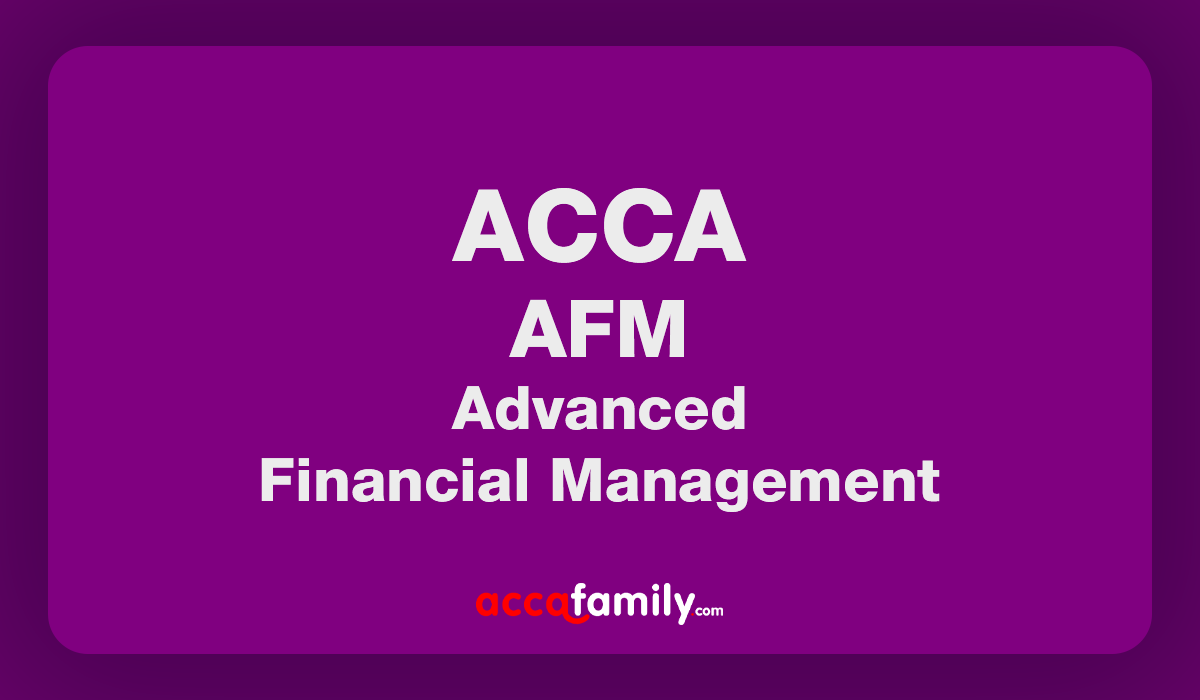Are you searching for comprehensive study materials and essential resources to master your ACCA P4 Advanced Financial Management exam? The Study Text P4 Advanced Financial Management (AFM) represents one of the most challenging professional-level papers in the ACCA qualification, demanding thorough preparation and quality study materials to achieve success.
This comprehensive guide explores everything you need to know about the ACCA P4 AFM module, from understanding its complexity to utilizing BPP study materials and PDF resources for optimal exam preparation. Whether you’re beginning your AFM journey or seeking last-minute revision strategies, this article provides actionable insights to enhance your study approach.
ACCA P4 AFM Exam Overview
| Exam Details | Information |
|---|---|
| Exam Duration | 3 hours 15 minutes |
| Question Format | Section A: 2 compulsory questions (50 marks each) |
| Pass Rate | Approximately 35-40% |
| Exam Sessions | March, June, September, December |
| Prerequisites | F9 Financial Management |
| Study Hours | 150-200 hours recommended |
What is ACCA P4 Advanced Financial Management Module
The ACCA P4 Advanced Financial Management module builds upon the foundational concepts from F9 Financial Management, taking candidates into complex corporate finance territories. This professional-level paper focuses on advanced financial management techniques, investment appraisal methods, and strategic financial decision-making processes.
The syllabus encompasses four primary areas that challenge your analytical and computational skills. Advanced investment appraisal forms the cornerstone, requiring mastery of real options, adjusted present value methods, and Monte Carlo simulations. Acquisitions and mergers constitute another critical component, examining valuation techniques, due diligence processes, and post-acquisition integration strategies.
Risk management represents the third pillar, covering interest rate risk, foreign exchange risk, and credit risk management through derivatives and hedging strategies. Finally, emerging issues in finance addresses contemporary challenges including Islamic finance, environmental considerations, and ethical investment approaches.
Core Competencies Required
Your success in P4 AFM depends on developing several key competencies. Quantitative analysis skills prove essential for handling complex calculations involving option pricing models, portfolio theory applications, and sophisticated discounting techniques. Strategic thinking enables you to evaluate financial decisions within broader business contexts, considering stakeholder interests and long-term implications.
Critical evaluation abilities help you assess different financing options, compare acquisition strategies, and recommend optimal capital structure decisions. Communication skills remain vital for explaining complex financial concepts clearly and presenting recommendations effectively to diverse audiences.
How Difficult is ACCA P4 Advanced Financial Management
The ACCA P4 AFM exam difficulty consistently ranks among the highest within the ACCA qualification structure. Historical pass rates typically hover between 35-40%, reflecting the paper’s challenging nature and the advanced technical knowledge required for success.
Several factors contribute to this difficulty level. Mathematical complexity stands out as the primary challenge, with candidates needing proficiency in calculus, statistics, and advanced financial modeling techniques. Unlike earlier papers focusing on application of standard formulas, P4 demands deep understanding of underlying mathematical principles.
Time pressure creates additional stress during examinations. The 3 hours 15 minutes allocated often feels insufficient for completing lengthy calculations while providing comprehensive written explanations. Many candidates struggle to balance computational accuracy with effective time management.
Common Challenges Faced by Candidates
Weak mathematical foundations frequently undermine candidate performance. Students who struggle with algebraic manipulation, logarithms, or statistical concepts find themselves at significant disadvantages. BPP study materials address these gaps through step-by-step mathematical explanations and practice exercises.
Inadequate understanding of financial theory poses another obstacle. P4 questions often require candidates to explain the rationale behind specific techniques rather than simply applying formulas mechanically. This theoretical depth distinguishes successful candidates from those who merely memorize procedures.
Poor exam technique contributes to many failures. Candidates sometimes focus excessively on calculations while neglecting written explanations, or vice versa. Effective preparation must balance both computational proficiency and clear communication skills.
Why Choose BPP for ACCA P4 AFM Study Materials
BPP Learning Media has established itself as the premier provider of ACCA study materials, particularly excelling in challenging papers like P4 Advanced Financial Management. Their comprehensive approach combines theoretical rigor with practical application, making complex concepts accessible to students worldwide.
The BPP Study Text for P4 AFM offers several distinctive advantages over alternative providers. Structured learning approach presents information in logical sequences, building from fundamental concepts to advanced applications. Each chapter includes learning objectives, worked examples, and self-test questions that reinforce understanding progressively.
Quality of explanations sets BPP materials apart from competitors. Complex topics like option pricing models receive detailed treatment with multiple worked examples, alternative solution approaches, and common pitfall warnings. This thoroughness proves invaluable when tackling challenging exam questions.
BPP’s Unique Features
Integrated question practice embeds relevant exam-style questions throughout each chapter rather than relegating them to separate sections. This approach helps you apply concepts immediately while learning, improving retention and understanding simultaneously.
Regular updates ensure materials reflect current syllabus requirements and examiner expectations. BPP maintains close relationships with ACCA, incorporating feedback from recent exam sessions into revised editions promptly.
Multi-format availability caters to diverse learning preferences. Whether you prefer traditional printed texts, interactive online platforms, or mobile-friendly digital formats, BPP provides options suited to your study style and schedule.
Benefits of Using PDF Study Materials
PDF study materials offer unique advantages for ACCA P4 AFM preparation, particularly valuable for busy professionals balancing work commitments with study requirements. The portability factor enables continuous learning regardless of location, transforming commute time and travel periods into productive study sessions.
Search functionality within PDF documents accelerates revision processes significantly. When reviewing specific topics or locating particular formulas, electronic searching proves far more efficient than manual page-turning through printed materials. This feature becomes particularly valuable during intensive revision periods.
Cost-effectiveness represents another compelling advantage. PDF materials typically cost substantially less than printed alternatives while providing identical content quality. For students managing tight budgets, this affordability factor often determines their ability to access premium study resources.
Digital Learning Advantages
Annotation capabilities allow personalized note-taking directly within study materials. You can highlight important passages, add marginal notes, and create digital bookmarks for quick reference during revision sessions.
Environmental sustainability appeals to environmentally conscious students. Choosing PDF materials reduces paper consumption and shipping-related carbon emissions while supporting sustainable educational practices.
Instant availability eliminates shipping delays and stock availability concerns. Upon purchase, materials become immediately accessible, enabling prompt commencement of study activities without waiting periods.
How to Plan Your ACCA P4 AFM Study Schedule
Effective study planning forms the foundation of successful P4 AFM preparation. The recommended 150-200 study hours require careful distribution across the syllabus areas, balancing thorough understanding with sufficient practice time.
Phase-based approach optimizes learning efficiency by dividing preparation into distinct stages. The foundation phase (40-50 hours) focuses on understanding core concepts, reviewing prerequisite knowledge from F9, and establishing mathematical competency. During this period, concentrate on building solid theoretical foundations rather than attempting complex calculations.
The development phase (60-80 hours) emphasizes skill building through progressive question practice. Begin with straightforward examples before tackling more challenging scenarios. BPP study materials provide excellent question banks organized by difficulty level, supporting gradual skill development.
Creating Your Personal Timeline
Backward planning from your exam date ensures adequate preparation time. Allow at least 4-6 months for thorough preparation, depending on your available study hours per week and prior financial management experience.
Weekly targets maintain momentum while providing flexibility for unexpected commitments. Aim for 8-12 study hours weekly, distributed across multiple sessions rather than concentrated into single marathon study periods.
Regular assessments track progress and identify areas requiring additional attention. Schedule mock exams every 3-4 weeks during the final preparation months, using results to guide revision priorities.
How to Effectively Prepare for ACCA P4 AFM Exam
Effective exam preparation extends beyond simply reading study materials and solving practice questions. Success requires strategic approaches that address both technical competency and exam technique simultaneously.
Active learning techniques prove more effective than passive reading for complex subjects like AFM. Create summary notes in your own words, teach concepts to others, and develop mental models linking different syllabus areas. These approaches deepen understanding while improving long-term retention.
Question analysis skills distinguish successful candidates from those who struggle despite strong technical knowledge. Before attempting solutions, invest time understanding what examiners seek. Analyze question requirements carefully, identify relevant techniques, and plan your approach before beginning calculations.
Advanced Study Strategies
Formula derivation strengthens conceptual understanding beyond rote memorization. When learning option pricing models or portfolio theory equations, work through derivations step-by-step. This deeper understanding enables adaptation when exam questions present unfamiliar scenarios.
Case study integration connects technical concepts with real-world applications. Research actual mergers, acquisitions, or financial restructuring examples, analyzing how P4 techniques apply in practice. This contextual understanding improves your ability to provide relevant recommendations in exam answers.
Peer discussion groups offer valuable perspectives on challenging concepts. Explaining concepts to others identifies knowledge gaps while gaining alternative viewpoints on complex issues. Online forums and local study groups provide excellent platforms for collaborative learning.
Last Minute Preparation Guide for P4 AFM
Last minute preparation requires focused strategies that maximize retention while building confidence for exam day. With limited time available, prioritize high-impact activities over comprehensive syllabus review.
Formula consolidation becomes critical during final weeks. Create concise formula sheets covering all essential calculations, including option pricing models, WACC calculations, and valuation techniques. Practice writing these formulas from memory until automatic recall develops.
Past paper analysis reveals examiner patterns and frequently tested areas. Focus on questions from recent exam sessions, paying particular attention to marking schemes and examiner comments. This analysis helps you understand expected answer depth and structure.
Final Week Strategy
Timed practice sessions simulate exam conditions while identifying potential time management issues. Complete full papers within specified time limits, including reading time allocations. This practice builds stamina while refining your exam approach.
Confidence building activities maintain positive mindset approaching exam day. Review successfully completed practice questions, revisit areas of strength, and remind yourself of preparation efforts invested. Avoid introducing completely new topics during this period.
Practical preparations ensure smooth exam day experience. Confirm venue location, transportation arrangements, and required materials. Prepare essential items the evening before to minimize morning stress and potential oversights.
Key Study Resources and Materials
Beyond BPP study materials, several supplementary resources enhance your P4 AFM preparation effectiveness. ACCA’s technical articles provide current perspectives on emerging financial management issues, often highlighting areas likely to feature in upcoming examinations.
Financial calculators become indispensable tools for complex calculations. Invest in approved models early in your preparation, becoming proficient with their advanced functions. Practice using calculator memory functions, statistical features, and cash flow analysis capabilities until operations become intuitive.
Online learning platforms supplement traditional study materials with interactive content. Video explanations, online quizzes, and virtual study groups provide alternative learning approaches suited to different preferences and schedules.
Professional Development Resources
Financial newspapers and publications maintain awareness of current market developments and regulatory changes. Publications like the Financial Times, The Economist, and industry journals provide real-world context for theoretical concepts.
Professional software exposure familiarizes you with industry-standard tools. While not required for examinations, understanding Excel’s financial functions, Monte Carlo simulation add-ins, and basic programming concepts enhances your practical competency.
Continuing education opportunities extend learning beyond exam requirements. Webinars, professional conferences, and industry seminars provide networking opportunities while deepening your financial management expertise.
Advanced Topics and Emerging Issues
The emerging issues section of P4 AFM reflects the dynamic nature of financial management practice. Environmental, Social, and Governance (ESG) considerations increasingly influence investment decisions and corporate financing strategies.
Sustainable finance concepts require understanding of green bonds, carbon pricing mechanisms, and sustainability-linked financing structures. These topics appear regularly in recent examinations, reflecting their growing importance in professional practice.
Technology impacts on financial management continue evolving rapidly. Artificial intelligence applications in risk management, blockchain technology for transaction processing, and fintech innovations in corporate banking represent emerging areas requiring professional awareness.
Contemporary Challenges
Regulatory complexity increases as financial markets become more interconnected and sophisticated. Understanding post-financial crisis regulations, Basel III requirements, and international accounting standards provides essential context for financial management decisions.
Globalization effects create both opportunities and challenges for multinational corporations. Currency risk management, international taxation considerations, and cross-border merger complexities require sophisticated analytical approaches.
Stakeholder capitalism concepts challenge traditional shareholder primacy models. Modern financial managers must balance multiple stakeholder interests while maintaining financial performance and regulatory compliance.
Exam Technique and Time Management
Effective exam technique often determines success margins in challenging papers like P4 AFM. Time allocation requires careful planning, with approximately 1.95 minutes available per mark. This constraint demands efficient approaches to both calculations and written explanations.
Answer structure should follow logical progressions from problem identification through analysis to recommendations. Begin with clear statements of your approach, show intermediate calculation steps, and conclude with well-reasoned recommendations supported by your analysis.
Partial credit strategies maximize marks even when complete solutions prove elusive. Examiners award marks for correct methodology, intermediate steps, and logical reasoning even when final answers contain errors. Show your working clearly to claim these valuable partial marks.
Advanced Exam Strategies
Question selection becomes critical when facing optional questions. Spend adequate time reading all options before committing to specific questions. Choose based on your confidence with the underlying concepts rather than superficial familiarity with question contexts.
Calculation verification prevents costly arithmetic errors. When time permits, use alternative approaches to verify critical calculations. Cross-checking using different methods builds confidence while identifying potential mistakes.
Professional presentation enhances examiner understanding and demonstrates communication competency. Use clear headings, logical paragraph structures, and professional language throughout your responses.
Key Takeaways
- The ACCA P4 Advanced Financial Management module demands comprehensive understanding of complex financial concepts and strong quantitative skills
- BPP study materials provide structured, comprehensive resources specifically designed for P4 success with detailed explanations and extensive practice questions
- PDF study materials offer flexibility, cost-effectiveness, and searchability advantages for busy professionals
- Effective preparation requires 150-200 study hours distributed across foundation building, skill development, and intensive revision phases
- Last minute preparation should focus on formula memorization, past paper practice, and confidence-building activities
- Success depends on combining technical competency with strong exam technique and effective time management skills
- Contemporary topics like ESG considerations and sustainable finance increasingly appear in examinations
Frequently Asked Questions
Q: How difficult is the ACCA P4 AFM exam compared to other professional level papers?
A: P4 AFM consistently ranks among the most challenging ACCA papers with pass rates typically between 35-40%. The mathematical complexity and time pressure make it particularly demanding compared to other professional-level papers.
Q: What mathematical skills are essential for P4 AFM success?
A: You need proficiency in calculus, statistics, algebra, and logarithms. The exam requires understanding of option pricing models, portfolio theory, and advanced discounting techniques beyond basic arithmetic.
Q: How long should I spend preparing for the P4 AFM exam?
A: Plan for 150-200 study hours over 4-6 months. This allows adequate time for building theoretical foundations, developing practical skills, and intensive revision before your exam date.
Q: Are BPP materials sufficient for P4 AFM preparation?
A: BPP materials provide comprehensive coverage of the syllabus with excellent explanations and practice questions. Most successful candidates use BPP as their primary resource, supplemented with past papers and additional practice questions.
Q: What calculator should I use for P4 AFM calculations?
A: Invest in an ACCA-approved financial calculator early in your preparation. Models like the Texas Instruments BA II Plus or HP 10bII+ offer advanced functions essential for complex P4 calculations.
Q: How should I allocate time during the P4 AFM exam?
A: With 3 hours 15 minutes available, allocate approximately 1.95 minutes per mark. Spend adequate time reading questions carefully before beginning calculations, and leave time for review at the end.
Q: What are the most frequently tested areas in P4 AFM?
A: Advanced investment appraisal, merger and acquisition valuation, risk management through derivatives, and emerging issues in finance appear regularly. Focus your revision on these core areas while maintaining broader syllabus coverage.
Conclusion
Mastering the ACCA P4 Advanced Financial Management exam requires dedication, strategic preparation, and quality study materials. The challenging nature of this professional-level paper demands comprehensive understanding of complex financial concepts, strong quantitative skills, and effective exam technique.
BPP study materials provide the structured foundation necessary for success, combining thorough theoretical explanations with extensive practice opportunities. Whether you choose traditional printed texts or convenient PDF formats, ensure your materials offer comprehensive syllabus coverage and current examiner insights.
Your preparation journey should balance thorough concept understanding with intensive question practice, supported by realistic time management and effective revision strategies. Remember that success in P4 AFM opens doors to senior financial management roles and demonstrates your capability to handle complex corporate finance challenges.
Begin your preparation early, maintain consistent study schedules, and approach this challenging qualification with confidence in your abilities and preparation quality. The Study Text P4 Advanced Financial Management (AFM) represents not just an exam hurdle but a gateway to advanced financial management expertise that will serve your professional career for years to come.










